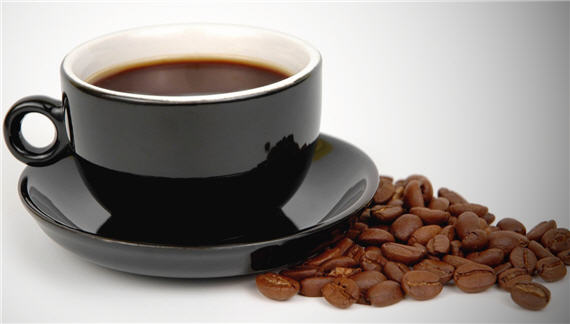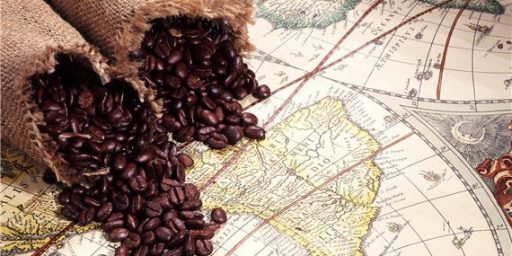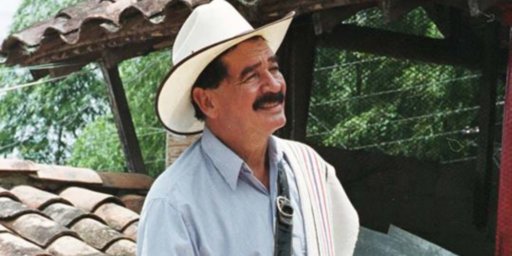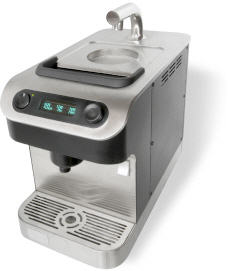The Next World Crisis: Peak Coffee?
Andrew Sullivan passes on a link that notes the possibility of another commodity shortage that may soon hit the world:
At the exact moment that rare beans are becoming all the rage, all beans are becoming rarer. The price of a cup of coffee—whether it be a $6 pour-over, a $2.50 dark roast at Starbucks, or a $1.50 mug of diner swill—is being driven up by a complex combination of weather events, pest and fungus outbreaks, speculation on commodities exchanges, an unstable labor market in the developing world, and an unprecedented thirst for good coffee among a growing global middle class. The problem, in simple economic terms, is that supply has gone down and demand has gone up.
(…)
Between 2006 and 2009, the Colombian yield shrank by a quarter—from 12 million bags to 7.8 million, the lowest yield in 33 years. The forecast doesn’t look good for the rest of the coffee-growing world, either: more pests in East Africa, more hurricanes in Central America, more droughts in Indonesia. Global coffee stockpiles are close to record lows. “There is simply not enough coffee in the world,” Jose Sette, now the former executive director of the International Coffee Organization, told Bloomberg in February. Combine this with other economic realities—the rising cost of fertilizer and the fact that young people, bound for the cities, aren’t following in their parents’ coffee-growing footsteps—and you can understand the term that Peter Baker has coined as a warning: “peak coffee.” Just like with oil, the world is maxing out the volume of coffee it can sustain.
I think I speak for morning people everywhere when I say that this is now the most important story in the world.






Say it ain’t so, Joe.
Juan Valdez…how could you let us down like this???
I’ll repeat my antipathy to the term “peak coffee” from when Joyner
reportedlinked the issue back in March; I think the concept is fundamentally misapplied to a renewable resource.Where is that giant bag of unroasted quality beans when I really need it?!
Call me when coffee starts to taste good. Or, for that matter, when your body truly gets a jolt from the caffeine rather than getting dependent on it after awhile.
I don’t drink coffee, problem solved.
I thought I knew coffee…. What is a “$6 pour-over”?
@reid: For $6 it had better be poured over a lump of gold.
@PD Shaw:
Heh, I held off doing a similar correction, but I’m glad someone did. “Peak” is a one-time high, a peak in the graph, easily visualized. For peak coffee production you’d need permanent loss of trees under cultivation.
Mrs. Olsen will fix this…I’m mean,m she’s got to, right?
Vietnam’s expecting a record harvest this year so the price of robusta is falling. If the price of arabica soars due to the weather and pest problems, expect substitutions.
This is not settled science. Sounds like one more example of algore trying to control our lives…
Saying that coffee is at a peak and that the world cannot sustain the consumption levels is ignorance at best, deceptive at worst. Coffee prices have always moved like a wave going slowly up and down as demand, supply and natural forces have moved it. Supply gets low and prices go up. More people grow coffee and as that coffee hits the market prices go down because more supply is available. The current demand for quality coffee has put unique pressures on the ability of some to obtain large amounts of quality green and has also spurred speculators (as opposed to investors actually in the coffee market) to add to the roller coaster ride. It is no longer just the coffee people of the world purchasing coffee futures, speculators are. This unnaturally drives up prices. And as quality coffee demands a higher price people pay more or move down to lower quality. Starbucks gains no advantage when a couple of thousand pounds of fabulous coffee hits the market. They can’t buy it. It won’t supply each of their stores with even a little. They are forced to purchase coffee large contracts to supply a huge market with consistency. Not to mention all of the lower level quality coffee providers down to the worst of the worst. If the market goes really high lots of people will start planting coffee and in about 3-5 years we will see a lot more stores of coffee available in the world. Problem will solve itself.